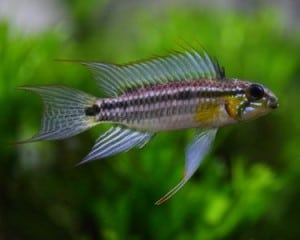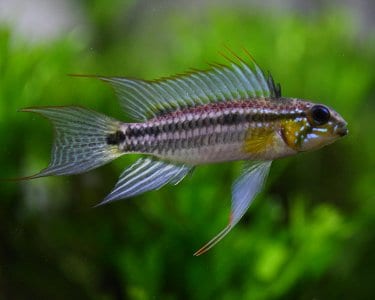
Common name: Banded Apisto, Banded Dwarf Cichlid, Two-Stripe Apisto
Scientific name: Apistogramma Bitaeniata
Average Adult Fish Size: 3 inches / 8 cm
Place of Origin: Amazon, Columbia, Brazil and Peru.
Typical Tank setup: Dense plantation will be greatly appreciated by the Banded Apisto as well as open swimming spaces.
Recommended Minimum Aquarium Capacity: 150 gallon / 600 litre
Compatibility: A large group of these dwarf cichlids should be kept together in order to allow them to exhibit their natural behaviour hence the large suggested recommended aquarium capacity. Keeping such a large group will also even out aggression between the Banded Apisto when kept together in the home aquarium.
Temperature: 76 – 86 Deg F / 25 – 30 Deg C
Water chemistry: pH 5.0 – 7.0
Feeding: Banded Apisto like all Apistogramma Cichlids are carnivores that feed primarily on insects, insect larvae, small crustaceans and small worms in their native environment. They do best in the aquarium environment when fed a variety of frozen and freeze-dried commercial foods like blood worms, brine shrimp, krill, tubifex worms and other similar meaty items. They can also be offered high quality carnivore flakes and mini pellets intended for freshwater carnivores. It is not recommended to feed only flake or pellet foods as this will typically lead to more a more faded coloration and will often lack all the nutrients and minerals required to maintain a healthy immune system.
Sexing: There’s no easy way of telling the sex of the Banded Apisto.
Breeding: Banded Apisto is a very difficult fish to breed, needing very low pH and perfect conditions. You should have slate and flower pots in the tank.
Additional Information: Banded Apisto (Apistogramma bitaeniata) are found in a relatively limited range of blackwater streams and tributaries in heavily forested areas of Colombia, Peru and Brazil. They prefer these slowly moving jungle river tributaries, where they use the dense vegetation, leaf litter and jungle canopy as protection from larger predatory fish species. The dense vegetation and leaf litter also provide ideal hunting grounds for the Banded Apisto to hunt for small insects, worms and crustaceans. They are widely imported from Peru and Brazil; as well as, being captive bred for the hobby. Banded Apisto are however somewhat difficult to keep since they require hard water (2-12 KH) and have little tolerance for fluctuations in water temperature or hardness. Apistogramma dwarf Cichlids in general have little tolerance for poor water conditions or quick water parameter fluctuations.


Related Posts
Croaking Gourami – Trichopsis vittatus
Paradise Fish – Macropodus opercularis
Schubert’s Barb – Barbus Semifasciolatus